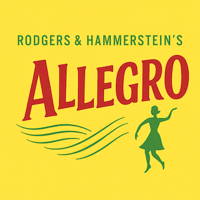
Overview
Synopsis
Allegro follows the life journey of Joseph Taylor, Jr., from his birth in a small Midwestern town to his rise as a successful doctor in the big city. The story opens with his childhood, as a Greek chorus narrates his growth and the values instilled in him by his parents—his hardworking, idealistic father and his devoted mother. As Joe matures, he falls in love with Jenny Brinker, a charming and ambitious young woman from a wealthier family. They marry despite warnings from friends and family that Jenny’s aspirations may conflict with Joe’s simple, altruistic ideals.
In the second act, Joe’s life becomes increasingly complicated as he moves to the city and achieves professional recognition. However, the pressures of wealth, social status, and his wife’s materialism begin to erode his sense of purpose. Torn between his desire to help others and the trappings of success, Joe ultimately faces a moral reckoning. Encouraged by his father’s memory and the chorus’s wisdom, he rediscovers his integrity and returns home to practice medicine among ordinary people—reaffirming his commitment to compassion, humility, and authentic living.
Show Information
Context
When Allegro premiered on Broadway in 1947, Rodgers and Hammerstein were at the height of their success, having already revolutionized musical theatre with Oklahoma! and Carousel. Eager to push the boundaries of traditional storytelling, they set out to create a more experimental and introspective work. Oscar Hammerstein II wrote an entirely original story that explored moral compromise and the corrupting influence of ambition—topics rarely addressed in musicals of the time. The creative team
to read the context for Allegro and to unlock other amazing theatre resources!Plot
Characters
| Name | Part Size | Gender | Vocal Part |
|---|---|---|---|
|
Lead |
Female |
Mezzo-Soprano |
|
|
Lead |
Male |
Tenor, Baritone |
|
|
Supporting |
Female |
Soprano |
|
|
Supporting |
Male |
Baritone, Tenor |
|
|
Supporting |
Male |
Baritone |
|
|
Supporting |
Female |
Mezzo-Soprano |
|
|
Featured |
Female |
Mezzo-Soprano |
|
|
Featured |
Male |
Baritone |
|
|
Featured |
Male |
Baritone |
|
|
Ensemble |
Not Specified |
|
Songs
Act I
Act II
A song with an asterisk (*) before the title indicates a dance number.
Monologues
Scenes
Key Terms
A character arc is the journey of personal growth, change, or transformation that a character undergoes throughout a play or musical. It often involves overcoming internal or external obstacles, leading to a deeper understanding of oneself or others. Strong arcs help audiences connect emotionally with characters and give structure to the overall narrative.
A concept musical is a type of musical structured around a central idea, theme, or message rather than a straightforward linear plot. Songs, characters, and scenes are often arranged to explore this unifying concept from different perspectives. This style allows for greater experimentation and can blend satire, social commentary, or abstract storytelling.
A theatrical style that distorts reality to convey inner emotional experience, popular in early 20th-century drama.
The imaginary wall separating the audience from the actors onstage, often 'broken' for direct address. This term plays a vital role in understanding theatrical structure and is commonly encountered in stagecraft or performance settings.
A group in Ancient Greek theatre that commented on the action, represented the public, and provided narrative insight.
A theatrical style that emphasizes simplicity in staging and dialogue to focus attention on core themes and performance.
Videos
Quizzes
Themes, Symbols & Motifs
Themes
Integrity vs. Ambition: At the heart of
to read about the themes, symbols and motifs from Allegro and to unlock other amazing theatre resources!Quote Analysis
Sorry! We do not currently have learning modules for this guide.